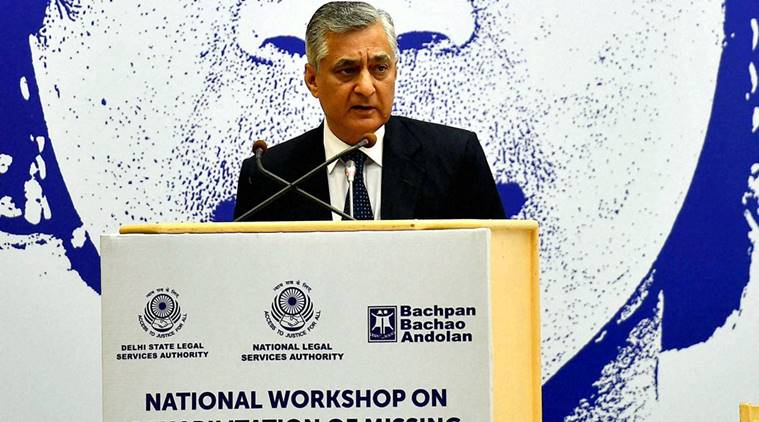Amid slogans on progress, need to give judiciary more judges: CJI
September 12, 2016 Chief Justice of India T S Thakur Sunday reiterated the urgent need to increase the number of judges in India, and said that “we may keep on inviting foreign direct investment and raising

September 12, 2016
Chief Justice of India T S Thakur Sunday reiterated the urgent need to increase the number of judges in India, and said that “we may keep on inviting foreign direct investment and raising slogans about progress” but it is essential that the judicial system also improve to deal with disputes arising from this progress.
Speaking at the first conference of judicial officers in Chhattisgarh, at the Bilaspur High Court, Justice Thakur said, “Today, there are only 18,000 judges in the country and we have a huge backlog of 3 crore cases in subordinate courts. I have been talking about it, in public platforms, in the presence of the Prime Minister, and made a very passionate appeal that this is a great challenge that the Indian judiciary faces. Not only the judiciary but the entire country faces, because we may keep on inviting foreign direct investment, we may keep on raising slogans about how the country is progressing but the judicial system also needs to improve to deal with disputes that will arise out of this progress.”
Elaborating on the need for judges, he said, “The per capita litigation in the country is dependent on literacy and prosperity. And literacy particularly… So the more aware the public about their rights, the greater the litigation in courts. So as literacy is increasing, and prosperity increases, the capacity of the people to go to courts increases.”
The Chief Justice said that as far back as in 1987, the Law Commission had recommended the need to induct 40,000 judges into the judicial system. “The government of India was told that we require a minimum of 40,000 judges in this country to make access to justice a reality. Thirty years down the line, instead of progressing to 40,000, we have gone back to 18,000.”
Speaking about the “inevitability” of new laws coming into place, Thakur spoke of the impact of these on the judicial infrastructure. “We have been saying that whenever there is a law, you must also simultaneously assess the impact of that law on the judicial infrastructure and provide for additional judicial infrastructure to care of the burden. But that has not been done. The state of affairs today is… you may adopt any approach for determining the number of judges that you require but the existing strength is totally insufficient,” he said.
“There are different methods for determining what is the judge strength required in the country. One is the judge-population ratio. in America, for every million, there are 150 judges. In India, for one million, we have 12 judges. There were some judgments by the Supreme Court which said increase this ratio from 12 per million to 50 per million in the first instance. Court said do it not immediately, but over a period of five years. Those five years have now gone, another five years have rolled by. We have not been able to take the ratio beyond 12 per million. We are stagnating there,” said Justice Thakur.
As he spoke to the judicial officers of Chhattisgarh, he said that it was not “their fault that they were so few in number,” but that if the situation does not improve, a backlog of 3 crore cases presently, could turn to 5 crore cases in the next 15 years. “You (judicial officers) are not supposed to be creating posts, you are not supposed to be part of that process. It is somebody else who has to do it. We have done research in the Supreme Court… and I am sending a report to the Prime Minister that whatever be the method, whether it is the case-judge ratio, or judge-population ratio, whatever the ratio, the number of judges are insufficient, they need to be added or increased. So that the people do not suffer injustice, as they have been doing for a long time,” he said.
With Chhattisgarh High Court Chief Justice Deepak Gupta in attendance, Thakur also turned the gaze inward and said that higher judiciary “should realise” that interacting with those working in the lower rungs is important.
“They (the higher judiciary) should realise that when judicial officers are invited to share their ideas with higher officers, higher judges, the higher courts, it helps the system. It inspires the judicial officers. It removes bottlenecks. It creates an atmosphere in which the distance between the district judiciary and the higher judiciary gets removed. This realisation should have been there among successive Chief Justices that held this august office and this process should have started long back (of conferences with judicial officers). That Justice Gupta has started is creditable..not only in Chhattisgarh but in other places too, these conferences should go on. The problem is that our system is so Chief Justice-centric that if you have a dynamic chief justice, things move. If you have a Chief Justice who is laidback, who is only content with his courtroom and nothing beyond, things don’t move,” Thakur said.
Read more at: http://indianexpress.com/article/india/india-news-india/amid-slogans-on-progress-need-to-give-judiciary-more-judges-cji/

